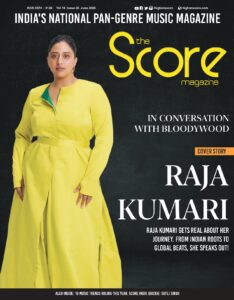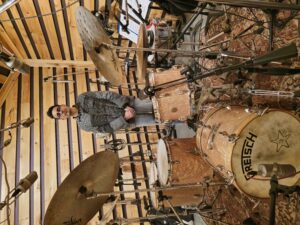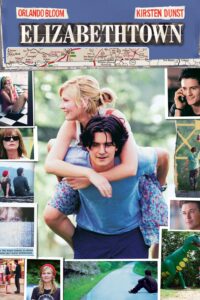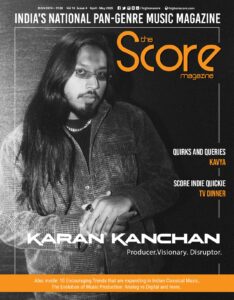Improvisation puts forth an intricate juxtaposition of faithful expression and precision of technique. The process of simultaneously playing dexterous runs, highlighting harmonic signposts through careful selection of notes, staying in the pocket while still emoting truthfully and showcasing originality could seem like an overwhelming conundrum.
We spoke to Brent Tauro, Anurag Naidu, Rahul Wadhwani and Rohan Rajadhyksha – some of our country’s most promising pianists and they were kind enough to let us in on their modus operandi when it comes to improvisation.
Here’s what they had to say:
Which artists/bands do you draw your influences from?
Brent: My all-time favorite band is Snarky Puppy. I draw a lot of inspiration from the legends – Stevie Wonder, Michael Jackson and Billy Joel. As a keyboard player, it’s important to be open to all types of music. Hence, I also draw inspiration from artists like John Mayer, Ed Sheeran and Coldplay. As far as keyboard players go, Greg Phillinganes, Cory Henry and Shaun Martin are my heroes.
Anurag: There are the usual piano heroes – Tigran Hamasyan, Brad Mehldau, Aaron Parks, Bill Evans, Robert Glasper and Keith Jarrett, to name a few. I do have a metal background, which is why I love Djent music. I also love Bach, Chopin, Beethoven, Rachmaninoff, Debussy and Mozart. My favorite band has always been Radiohead, though Brad Mehldau’s After Bach and Fred Hersch’s Open Book have made me question my existence from time to time.
Rahul: Western classical influences include Chopin, Mozart, and Bach; Indian classical – Kumar Gandharv, Bhimsen Joshi; Bollywood – AR Rahman; Jazz – Keith Jarret, Bill Evans, Oscar Peterson, Art Tatum.
Rohan: Off the top of my head – Sting, Radiohead, Sufijan Stevens, Kendrick Lamar, Phil Collins, James Blake, A.R. Rahman, Jacob Collier and the list goes on.
What does improvisation mean to you?
Brent: It’s all about expression. It’s about feeling an emotion and having developed the vocabulary to translate it through your instrument. Improvisation is influenced by everything we are – from the people we meet, to the places we’ve been, to the last conversation we had.
Anurag: Improvisation is extemporization. It is unprepared material that has been worked on but not worked out. It is also the relatable extension of an already existing piece of information. Hence, it always has to be in context – which means that every moment has to be justified by what precedes it and what follows it. It’s about being original while respecting everything before you.
Rahul: It’s a source of communication. What I improvise at a particular moment is what I feel and what I want to say then.
Rohan: Responding to the moment with authenticity.
What is your approach to improvisation?
Brent: The groove is everything. I tend to play behind the beat just a hair, which I love the sound of. But yeah, you got to have that pocket. As far as note choices go, it evolves with your palette. I’ve seen people use the most complex runs and others use a single note, yet both equally qualify as examples of improvisation and both sound amazing.
Anurag: The piano is an extension of my voice. That’s the beauty of the instrument – it allows for polyphony and polyrhythm. When I improvise, I just try to begin with an idea and let it grow. I try to sing all my phrases. I never play anything that my brain hasn’t already conceived, so it doesn’t sound plastic. I also try to involve the actual melody of the tune into my improvisation.
Rahul: I prefer not to think when I am improvising. That kills the purpose for me. When I practice at home, I focus on technique and theory. When I improvise in front of people, I just play and make the best of that moment.
Rohan: I attempt to follow my ears as much as possible and try not to let my mind dictate where it’s going. It’s a fine balancing act between turning your brain off and keeping your ears sharply tuned to your environment.
What was the biggest challenge you faced when you started improvising and how did you overcome it?
Brent: Listening, and overdoing it. When it’s our turn to take a solo, we feel obligated to use every musical motif we’ve ever learnt and vomit it over the changes. Stop. Listen. The more you listen, the more you feel it. If you feel it, the audience will too.
Anurag: Keeping steady time. As a classical pianist you never develop the concept of great time, as it’s mostly free. I felt a huge handicap playing rhythmic music and finding a good pocket. There was no shortcut. I worked super hard on it and somehow over came it.
Rahul: I used to think a lot in the beginning. Am I playing well? Is that person in the audience listening to me? That was the worst feeling and I wanted to get rid of it. I realized that the cause of those feelings was that I didn’t have a formal training. After learning about music theory and technique, those thoughts reduced. Knowledge makes you calmer I think, and helps you see the bigger picture.
Rohan: The challenge I continually face is vocabulary. It takes me time to sink into a certain type of vocabulary and internalize it enough to express and improvise with it. But it’s a good challenge, because often if you’re really listening hard enough, you can turn your weaknesses into your strengths!
Could you share some tips on improvisation for beginners?
Brent: Do not use the subject of improvisation as a means of escaping dedicated practice and developing your vocabulary. Secondly, listen. Listening to other musicians allows you to feed off their energy. And everyone knows there’s nothing better than seeing a bunch of musicians vibing it out!
Anurag: Go to the source. You like Cory Henry, listen to Oscar Peterson. You like Robert Glasper, listen to Ahmad Jamal. You like Neo Soul, listen to Herbie. Try to study theory and understand how they did what they did. And once you do that, use the information to inspire, not duplicate material.
Rahul: Learn one thing at a time. Learn the language. Keep your practice as short and focused as possible. If you’re facing problems with practicing read “Effortless Mastery” by Kenny Werner. Finally when you play, forget about everything and just play.
Rohan: Listen to loads of music! Try to figure out and play everything that gets stuck in your head. The more you play the music you want to emulate, the more you will build your vocabulary. And most importantly, have fun!
Brent, Anurag, Rahul and Rohan are very active in the country’s music scene and have evidently worked extremely hard to be where they are today.
Look out for their existing and upcoming projects: Brent’s primary outfit is a pop rock band called Strike Three. Anurag is currently working on releasing his debut album, J’ai Fame. Rahul is working on his solo piano project and plans to tour with that music by the end of the year. Rohan has been gigging across the country with the likes of Tajdar Junaid, Dhruv Vishwanath and Sid Vashi, amongst others. He is currently working on his original material as well








